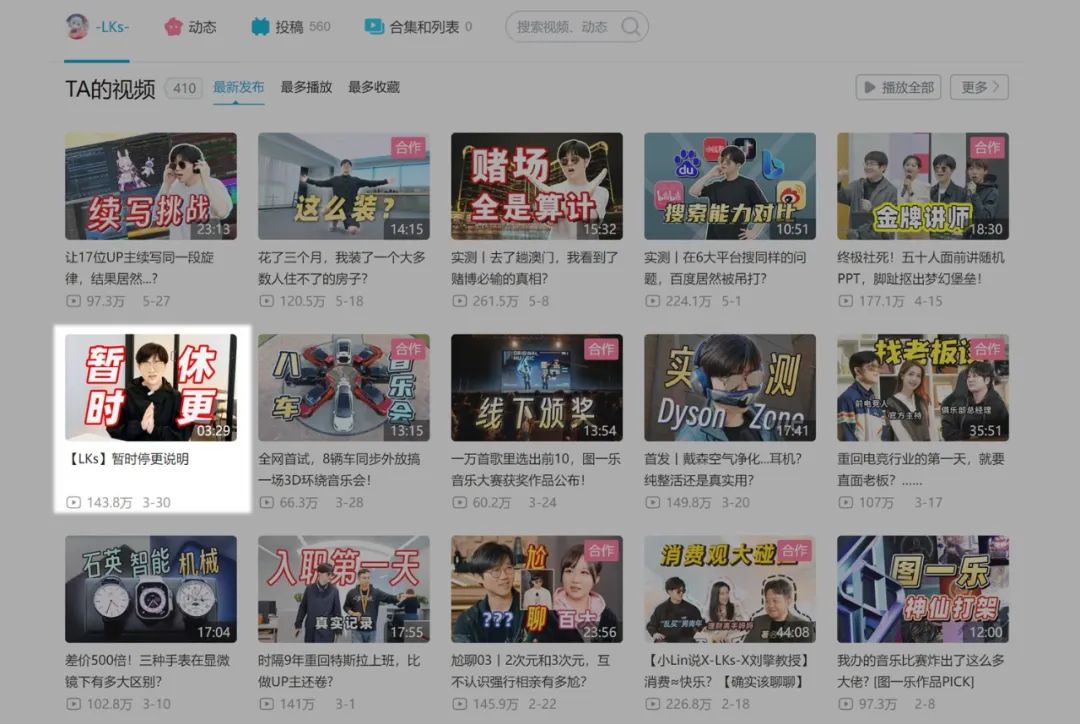Are China’s Vloggers on Strike?
来源网站:mp.weixin.qq.com
作者:Sixth Tone
主题分类:
内容类型:
关键词:
涉及行业:
涉及职业:
地点: 无
相关议题:
- 自3月底以来,Bilibili平台上的一些最受欢迎的视频博主已经宣布退出平台,这被称为“停更潮”。
- Bilibili的收益分享政策的多次修改使许多博主的收入大幅下降,据报道,2018年前100名Bilibili内容创作者中有近20%不再上传新内容。
- 尽管许多视频制作者退出平台,但他们避免将“停更潮”视为对Bilibili收益分享削减的集体回应,而是更倾向于引用个人原因,如过度劳累。
- 由于平台经济的性质,创作者和科技公司之间的劳动关系并不明显,许多博主享有高度的自主权,可以在不受约束的情况下跳槽到其他平台。
- 尽管有人质疑Bilibili的最重要的用户是否在罢工,但中国的内容创作者并不认为自己是一个与平台利益相对立的更大集体的一部分。
以上摘要由系统自动生成,仅供参考,若要使用需对照原文确认。
Organizing a strike is hard. Getting independent content creators to see themselves as workers, rather than entrepreneurs, may be even harder.
Bilibili, the video-sharing platform sometimes touted as China’s answer to YouTube, boasts more than 300 million monthly active users and as many as 3.8 million active content creators. It’s also in crisis: Since the end of March, a number of the site’s most popular vloggers have called it quits, retiring from the platform via high-profile announcements that have been viewed hundreds of millions of times on Chinese social media.
Of the top 100 Bilibili content creators in 2018, close to 20% are no longer uploading new content to the site, according to a March media report. Things seemed to reach a breaking point over the last year and a half, as the site repeatedly revised its monetization policy to the detriment of many channels. Sixth Tone’s sister publication, The Paper, cited anonymous content creators as saying their revenue from the platform had dropped anywhere from 30% to as much as 90%.
Thus far, creators have avoided framing the “hiatus wave,” as it’s known in Chinese, as a collective response to Bilibili’s revenue-sharing cuts, instead preferring to cite personal reasons such as burnout. But the sheer number of video producers quitting the platform has led some fans to wonder: Could Bilibili’s most important users be on strike?
The answer is almost certainly no, and not just because content creators are hesitant to call it one. The hiatus wave has become a kind of Rorschach test for how the industry views itself, and it’s clear that China’s content creators do not see themselves as a part of a larger collective whose interests are opposed to the platform’s. The real question isn’t whether China’s creators are on strike, but to what extent they see themselves as “workers” at all.
Although large tech companies are ironically referred to as “big factories” in China, the labor relationship between creators and tech companies is obscured by the nature of the platform economy. If we understand Bilibili as a literal factory, then vloggers’ refusal to produce new content could be interpreted as a labor walkout. Bilibili — and no small number of vloggers — would likely counter by pointing out that creators are independent: They don’t sign labor contracts, enjoy a high degree of autonomy, and are free to jump between platforms in search of a better deal.
The reality, however, is that platforms like Bilibili and YouTube enjoy a near monopoly over whole sectors of the market, leaving content creators with few profitable alternatives. A long-form video creator cannot easily jump to TikTok in search of a better deal. Even those who do find a suitable alternative know that their new home might change its monetization scheme at any time.
In short, content creators aren’t as independent as they first seem. Their lack of agency is all the more apparent if we take into account the fact that, even if they have free rein over the creative process, they cannot reach their followers directly: Both their distribution and revenue channels are fully controlled by the platforms. Given their reliance on, and subordinance to, video platforms, creators are best understood as flexibly employed workers in the gig economy.
That description rankles many creators, who prefer to think of themselves as small entrepreneurs or future bosses. Encouraged by the runaway success of a small handful of vloggers, there is a widespread belief in the community that financial freedom is always just a video away.
This attitude is characteristic of neoliberal ideology — in particular, the way it shapes our self-perceptions to produce what German scholar Ulrich Bröckling called the “entrepreneurial self.” The term refers to the process of unending self-improvement that individuals must undertake out of a fear of being excluded from the market. In contrast to traditional labor-capital relations, in which workers hand over some of their freedom in exchange for a manager who assumes a degree of responsibility for them, the ideology of the entrepreneurial self instead pushes people to view themselves as the “CEOs” of their lives.
A screenshot shows the account of -LKs-, a Bilibili uploader with over 3 million followers who suspended his channel on March 30, 2023. From Bilibili
According to Bröckling, the formation of the entrepreneurial self can be divided into two processes: the “work of subjectification” and the “subjectification of work.” The former involves a worker exercising greater self-organization and self-restraint as a means of maximizing their productivity, with the result that their daily life increasingly resembles the operation of a company. To reclaim their time, workers become less concerned with demanding raises and better benefits from their employers, and more with how they can become bosses themselves.
The subjectification of work, meanwhile, refers to the blurring of work-life boundaries as people engage in self-economizing and self-rationalizing behavior. For example, laborers save up for their dream of starting a business by eating at home, limiting their entertainment expenditures, and refraining from splurging on luxury goods. At the same time, they spend heavily on costly training seminars in the name of self-improvement.
In the case of content creators, the two processes seem to have merged. Even as they upload their work to platforms like Bilibili, they “download” neoliberal values that shape their identities and disguise the reality of their situation. In the process, they’ve become the perfect blend of a capitalist’s mind and a worker’s body — a major reason why so few have called the current hiatus wave a strike.
The outcome of the tug-of-war between content creators and platforms will be determined by two factors. The first is how content creators define themselves — namely, if they recognize that their content is what keeps the platform alive, or if they instead see themselves as dependent on the platform to make a living. The second is their capacity to organize and achieve collective action in the face of platforms’ attempts to divide and conquer. Not to be overlooked is the power of fans and the public: If users rally behind creators, they will have more leverage in their negotiations with platforms.
The early returns are not promising: A number of high-profile creators have already reactivated their accounts. But the hiatus wave nevertheless forces us to reconsider labor-capital relations in the digital age. In the past, labor conflicts were understood as conflicts between workers and their employers. With the rise of neoliberalism and platform capitalism, more and more people, including drivers, couriers, and vloggers, are participating in the market as ostensibly independent entities. But this independence is highly contingent: Whichever platform is able to seize control of the market for a certain product or service wields immense power over these “entrepreneurs,” trapping them in a vulnerable, ambiguous state from which escape is all but impossible.
The development of the platform economy has provided people with a wealth of opportunities. In exchange, however, platforms have manipulated workers’ sense of self-worth and the value they ascribe to their labor. The more abundant the opportunities they provide, the greater the hold they have over the people who work for them. This latest trend of content creators going on hiatus is just the tip of the iceberg. As platform capitalism becomes inescapable, it’s crucial that we see it for what it is: a more invisible, but no less real extraction of workers’ surplus value.
Zheng Guanghuai is a professor of sociology at Central China Normal University.
Translator: Lewis Wright; editor: Cai Yiwen; portrait artist: Wang Zhenhao.
(Header image: The mascot of Bilibili poses for a photo during ChinaJoy in Shanghai, 2020. IC)
APK file for Android:
https://image4.sixthtone.com/pkg/sixthtone.apk(Copy URL and open in browser)



